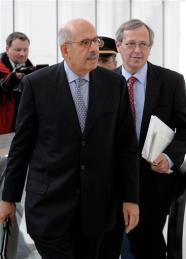Iran LEU Deal Drafted, on the Table
October 21, 2009
Featured Image
A Draft Deal - Julian Borger's Global Security Blog in the Guardian [link]
- After more than two days of hard bargaining, it now looks like the Iranian delegation in Vienna did not have final authority to sign away most of the country's stock of enriched uranium (arguably Iran's greatest strategic asset) for processing abroad.
- The ElBaradei version envisaged sending out most (up to three-quarters, by most accounts) of Iran's low enriched uranium (LEU) to Russia for further enrichment and then to France for fabrication into fuel. It would then be returned to Iran (after about a year) for use in the Tehran Research Reactor, for making medical isotopes. The fuel would be sent out by the end of the year, and sent out in bulk, not in small parcels.
- The Iranian government, not known for smooth decision-making, now has two days to make one of the most critical choices of the past few years, that will help determine the direction this long-running crisis over its uranium enrichment takes.
Poland Agrees to Accept U.S. Missile Interceptors - New York Times [link]
- Vice President Joseph R. Biden Jr. moved to repair a rift with Eastern Europe on Wednesday by announcing an agreement to station interceptors from President Obama’s reformulated missile defense system on the territory of this NATO ally.
- The deal to base here some of the smaller, mobile SM-3 interceptors at the heart of Mr. Obama’s new missile defense plan may help reassure the region that the United States remains committed to its security.
- To further reinforce the point, Mr. Biden plans to fly later in the week to the Czech Republic, which was also part of the Bush system and riled by its cancellation, to discuss basing elements of the Obama missile shield there.
Nuclear Negotiator: Time to Ratify Comprehensive Testing Ban - Salt Lake Tribune [link]
- There was no sudden revelation. No moment of clarity. No conscientious shift. Over time, things just changed. That's how Linton Brooks, former administrator of the National Nuclear Security Administration and a longtime detractor of the Comprehensive Test Ban Treaty, decided the United States should finally join 150 other nations that have ratified the accord.
- Here's Brooks' read:
- But over the past 10 years, great strides have been made in technologies that can simulate explosions -- data that can be derived from computer modeling is nearly as good as that which would be gleaned from an underground test.
- And since the political winds likely prevent nuclear testing anyway, he said, the U.S. would not be giving up a lot by formalizing an arrangement it's had since Sept. 23, 1992 -- the last time an underground test took place, in Nevada.
- What would [the U.S.] gain? Renewed status as an international leader on nuclear control issues -- and a bully pulpit from which to pressure other nations that have not ratified the treaty, including China, Israel, Iran and North Korea.
The Future Nuclear Powers You Should Be Worried About - Foreign Policy [link]
- Iran's and North Korea's nuclear programs -- not to mention the risk of loose nukes in Russia or Pakistan -- are worrying enough. But a number of other countries are looking to join the nuclear club, with terrifying potential consequences.
A View from the Dark Side
Why We Need to Test Nuclear Weapons - John Kyl in the Wall Street Journal [link]
- Mr. Obama also said, on behalf of the U.S., that "We will move forward with the ratification of the Comprehensive Test Ban Treaty" (CTBT). This is a profound mistake, as a ban on testing nuclear weapons would jeopardize American national security.
- There were concerns a decade ago that the U.S. might be unable to safely and reliably maintain its own nuclear deterrent—and the nuclear umbrella that protects our allies such as Japan, Australia and South Korea —if it forever surrendered the right to test its weapons.
- Those concerns over aging and reliability have only grown. Last year, Paul Robinson, chairman emeritus of Sandia National Laboratory, testified before Congress that the reliability of U.S. nuclear weapons still cannot be guaranteed without testing them, despite more than a decade of investments in technological advancements.
- The immediate challenge we face is the threat posed by nuclear proliferation in the hands of rogue regimes. That, and not a flawed, irrelevant test ban treaty, is what the administration should focus on.



